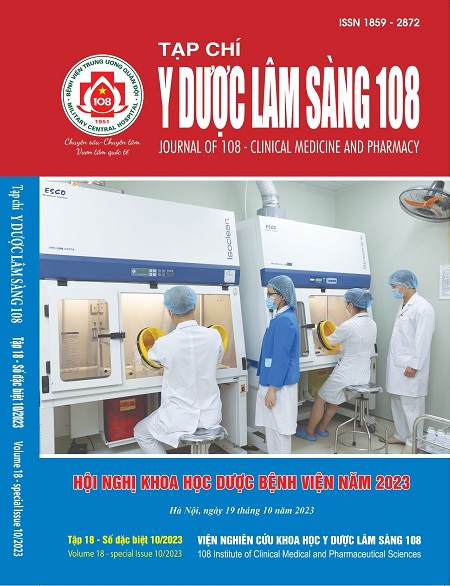Anticoagulant treatment and its hemorrhagic complications in SARS-CoV-2 patients
Main Article Content
Keywords
Abstract
Objective: The purpose of this study is to describe the use of anticoagulant therapy and associated hemorrhagic complications in SARS-CoV-2 patients. Subject and method: We conducted a prospective observational study on 492 patients admitted to the Covid-19 Center of University of Medicine and Pharmacy Hospital in Ho Chi Minh City between August and December 2021. Result: 95.7% of patients received anticoagulant therapy, in particular low molecular weight heparin (LMWH), unfractionated heparin (UFH), and vitamin K antagonists of 90.45%, 8.92%, and 0.63%, respectively. The overall incidence of bleeding was 12.6%, which occurred most commonly in the gastrointestinal system, accounting for 50% of all hemorrhagic cases. The incidence of fatal bleeding was 11.29%. History of bleeding (OR: 7.18; 95%CI: 1.29-39.73; p=0.024) and eGFR < 60ml/min/1.73m2 (OR: 1.82; 95%CI: 1.00-3.29; p=0.048) were associated with hemorrhage. Conclusion: A large percentage of patients with SARS-CoV-2 received anticoagulant therapy. History of bleeding and eGFR <60 ml/min/1.73m2 were associated with hemorrhagic complications.
Article Details
References
2. Bikdeli B, Madhavan MV, Jimenez D et al (2020) COVID-19 and Thrombotic or Thromboembolic Disease: Implications for Prevention, Antithrombotic Therapy, and Follow-Up: JACC State-of-the-Art Review. J Am Coll Cardiol 75(23): 2950-2973.
3. Cattaneo M, Bertinato EM, Birocchi S et al Pulmonary embolism or pulmonary thrombosis in COVID-19? Is the recommendation to use high-dose heparin for thromboprophylaxis justified? Thromb Haemost 120(8): 1230-1232.
4. Cui S, Chen S, Li X, Liu S, and Wang F (2020) Prevalence of venous thromboembolism in patients with severe novel coronavirus pneumonia. J Thromb Haemost 18(6): 1421-1424.
5. Fraissé Megan, Elsa Logre, Olivier Pajot et al (2020) Thrombotic and hemorrhagic events in critically ill COVID-19 patients: A French monocenter retrospective study. Critical Care 24(1): 275.
6. Hamad MA, Dasuqi SA, Aleem A et al (2021) Assessment of anti-factor Xa activity in critically ill COVID-19 patients receiving three different anticoagulation regimens. SAGE Open Med 9(20503121211049931.
7. Lucatelli P, De Rubeis G, Citone M et al (2020) Heparin-related major bleeding in Covid-19-positive patient: Perspective from the outbreak. Cardiovasc Intervent Radiol 43(8): 1216-1217.
8. Paranjpe I, Fuster V, Lala A et al (2020) Association of treatment dose anticoagulation with in-hospital survival among hospitalized patients with COVID-19. J Am Coll Cardiol 76(1): 122-124.
9. Smythe MA, Priziola J, Dobesh PP et al (2016) Guidance for the practical management of the heparin anticoagulants in the treatment of venous thromboembolism. J Thromb Thrombolysis 41(1): 165-186.
10. Streng AS, Delnoij TSR, Mulder MMG et al (2020) Monitoring of unfractionated heparin in severe COVID-19: An observational study of patients on CRRT and ECMO. TH Open 4(4): 365-375.
 ISSN: 1859 - 2872
ISSN: 1859 - 2872
